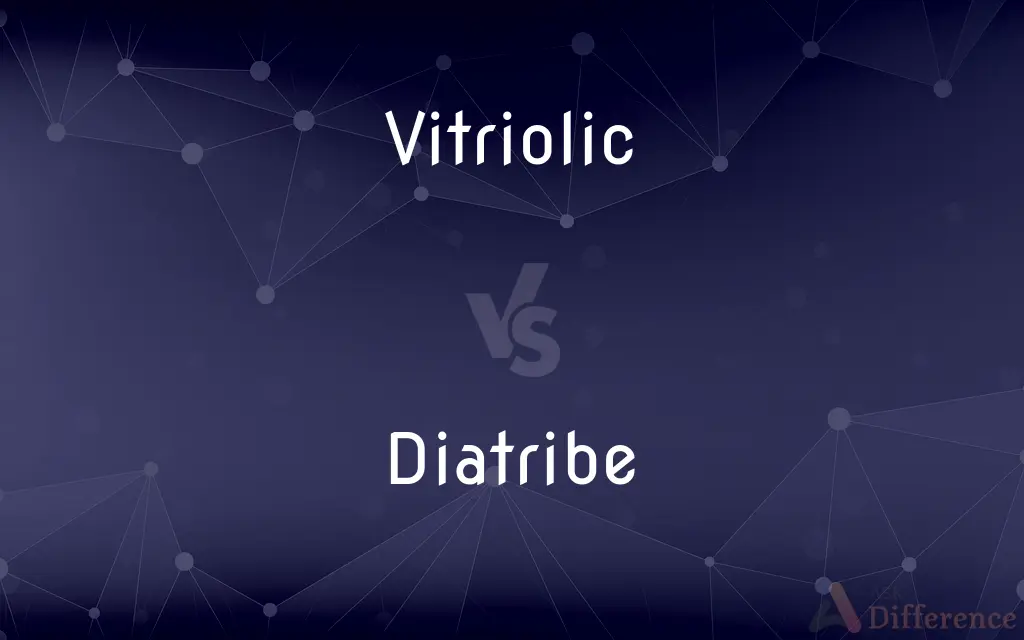Vitriolic vs. Diatribe — What's the Difference?
Edited by Tayyaba Rehman — By Maham Liaqat — Updated on April 16, 2024
Vitriolic describes harsh and bitter criticism, whereas a diatribe is a prolonged and abusive speech or piece of writing.

Difference Between Vitriolic and Diatribe
Table of Contents
ADVERTISEMENT
Key Differences
Vitriolic language is characterized by sharp, bitter, and cutting expressions, often used to convey deep resentment or anger. On the other hand, a diatribe is a specific type of discourse, typically long and vehement, aimed at denouncing or attacking someone or something.
While vitriolic refers to the tone and style of the language, often filled with acerbic or caustic qualities, a diatribe involves not just the tone but also the format it is an extended rant or criticism, usually quite detailed and focused on a particular subject or individual.
Vitriolic can be used to describe any form of communication, from a single sentence to a full-length article, as long as the tone is sufficiently acidic and sharp. Conversely, a diatribe is inherently lengthy and detailed, suggesting not just a critique but a thorough denunciation.
The purpose of using vitriolic language might be to hurt, insult, or express deep-seated animosity. Whereas, the purpose of a diatribe extends beyond expression to persuasion, attempting to convince the audience of the wrongness of a person or concept through sustained argumentation.
While vitriolic serves as an adjective describing the poisonous nature of words, a diatribe is a noun that describes a particular form of verbal onslaught, typically sustained and comprehensive in its approach.
ADVERTISEMENT
Comparison Chart
Definition
Language filled with bitter, caustic criticism.
A prolonged and abusive speech or writing.
Purpose
To express anger or resentment, often in a sharp manner.
To attack or denounce in a lengthy discourse.
Format
Can be part of any communicative act.
Usually a long monologue or written piece.
Intensity
High, due to sharpness and bitterness.
High, due to length and severity of critique.
Usage in Sentence
Describes the tone or style of speech/writing.
Describes the type of speech or writing.
Compare with Definitions
Vitriolic
Having a caustic quality.
The review was unexpectedly vitriolic.
Diatribe
An extended and abusive rant.
The coach's post-game diatribe went viral.
Vitriolic
Filled with bitter criticism or malice.
The debate turned sour as remarks became vitriolic.
Diatribe
A lengthy and bitter attack in speech or writing.
The article was a diatribe against corporate corruption.
Vitriolic
Sharp and bitter.
Her vitriolic wit could cut through the toughest demeanor.
Diatribe
A prolonged discourse that is aggressively critical.
His speech turned into a diatribe against the government.
Vitriolic
Intended to burn or corrode.
His words were as vitriolic as acid.
Diatribe
An accusatory moral denunciation.
His novel includes a diatribe on societal decay.
Vitriolic
Extremely severe or harsh in tone.
His vitriolic comments left everyone stunned.
Diatribe
A detailed and sustained criticism.
She unleashed a diatribe on the failings of the recent policy.
Vitriolic
Of, similar to, or derived from a vitriol.
Diatribe
A diatribe (from the Greek διατριβή), also known less formally as rant, is a lengthy oration, though often reduced to writing, made in criticism of someone or something, often employing humor, sarcasm, and appeals to emotion.
Vitriolic
Bitterly scathing; caustic
Vitriolic criticism.
Diatribe
A forceful and bitter verbal attack against someone or something
A diatribe against consumerism
Vitriolic
Of or pertaining to vitriol; derived from or resembling vitriol.
A vitriolic taste
Diatribe
A bitter, abusive denunciation.
Vitriolic
(figuratively) Bitterly scathing, caustic.
Vitriolic criticism
Diatribe
An abusive, bitter verbal or written attack, criticism or denunciation.
The senator was prone to diatribes which could go on for more than an hour.
Vitriolic
Of or pertaining to vitriol; derived from, or resembling, vitriol; vitriolous; as, a vitriolic taste. Cf. Vitriol.
Diatribe
A prolonged discourse; a long-winded speech.
Vitriolic
Biting, bitter or caustic; having or expressing strong and unpleasantly negative feelings; - of speech or feelings; the vitriolic denunciations of opponents by partisan columnists.
Diatribe
A prolonged or exhaustive discussion; especially, an acrimonious or invective harangue; a strain of abusive or railing language; a philippic.
The ephemeral diatribe of a faction.
Vitriolic
Harsh or corrosive in tone;
An acerbic tone piercing otherwise flowery prose
A barrage of acid comments
Her acrid remarks make her many enemies
Bitter words
Blistering criticism
Caustic jokes about political assassination, talk-show hosts and medical ethics
A sulfurous denunciation
Diatribe
Thunderous verbal attack
Vitriolic
Of a substance, especially a strong acid; capable of destroying or eating away by chemical action
Common Curiosities
What is a diatribe?
A diatribe is a prolonged, abusive speech or piece of writing that criticizes someone or something in a severe manner.
Can a diatribe be vitriolic?
Yes, a diatribe can be vitriolic if it is characterized by particularly bitter and harsh language.
What does vitriolic mean?
Vitriolic refers to speech or writing that is filled with bitter, harsh criticism.
How does the purpose of vitriolic language differ from that of a diatribe?
Vitriolic language aims to express deep anger or resentment, while a diatribe aims to criticize or denounce through detailed argumentation.
Is a diatribe always negative?
Yes, a diatribe is inherently negative, focusing on criticism and denunciation.
Can anyone use vitriolic language?
Yes, anyone can use vitriolic language if they choose to express themselves in a harsh, bitter manner.
Is it effective to use a diatribe in a debate?
While it can capture attention, using a diatribe in a debate often undermines the debater’s credibility due to its overly aggressive tone.
What makes a speech or article a diatribe?
The length, the abusive nature, and the intent to harshly criticize or denounce define a diatribe.
What are the consequences of using vitriolic language?
Using vitriolic language can alienate others, escalate conflicts, or damage relationships.
How can one identify if a piece of writing is vitriolic?
If the writing is characterized by severe, bitter criticism or a scathing tone, it can be identified as vitriolic.
What is the difference between a rant and a diatribe?
While both are expressions of criticism, a diatribe is typically more structured and sustained than a rant, which can be more spontaneous and less focused.
Can vitriolic be used to describe a positive situation?
No, vitriolic specifically implies a negative, harsh, and biting tone.
Does a diatribe have to be verbal?
No, a diatribe can also be written; it is not restricted to spoken form.
Why might someone choose to deliver a diatribe?
Someone might deliver a diatribe to vent frustration, persuade others of their viewpoint, or publicly denounce what they see as wrong.
How can one respond to a diatribe?
Responding to a diatribe might involve addressing the points raised calmly and rationally, or choosing to disengage to avoid escalation.
Share Your Discovery

Previous Comparison
Palestinian vs. Philistine
Next Comparison
Dipole vs. BipoleAuthor Spotlight
Written by
Maham LiaqatEdited by
Tayyaba RehmanTayyaba Rehman is a distinguished writer, currently serving as a primary contributor to askdifference.com. As a researcher in semantics and etymology, Tayyaba's passion for the complexity of languages and their distinctions has found a perfect home on the platform. Tayyaba delves into the intricacies of language, distinguishing between commonly confused words and phrases, thereby providing clarity for readers worldwide.













































